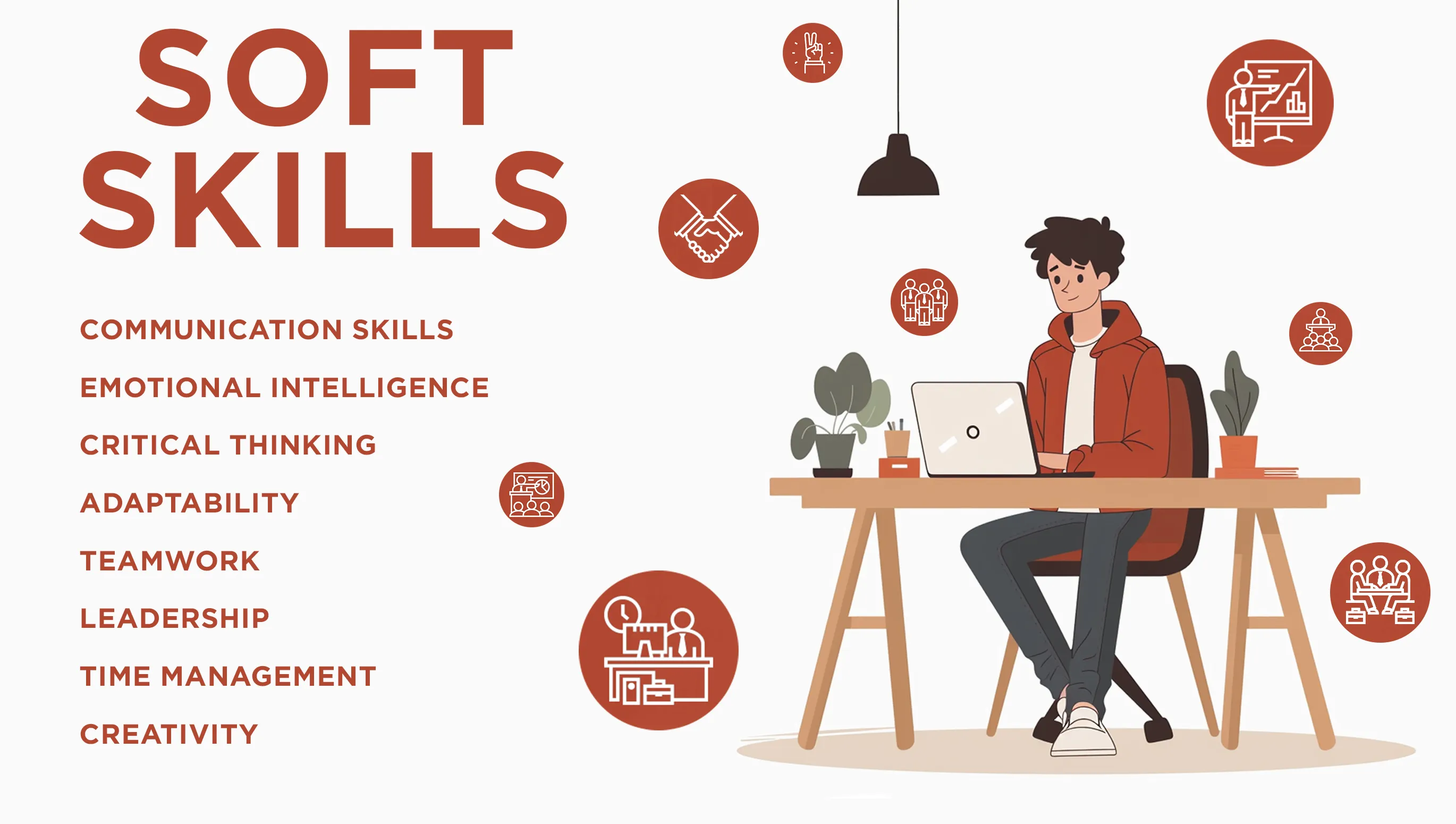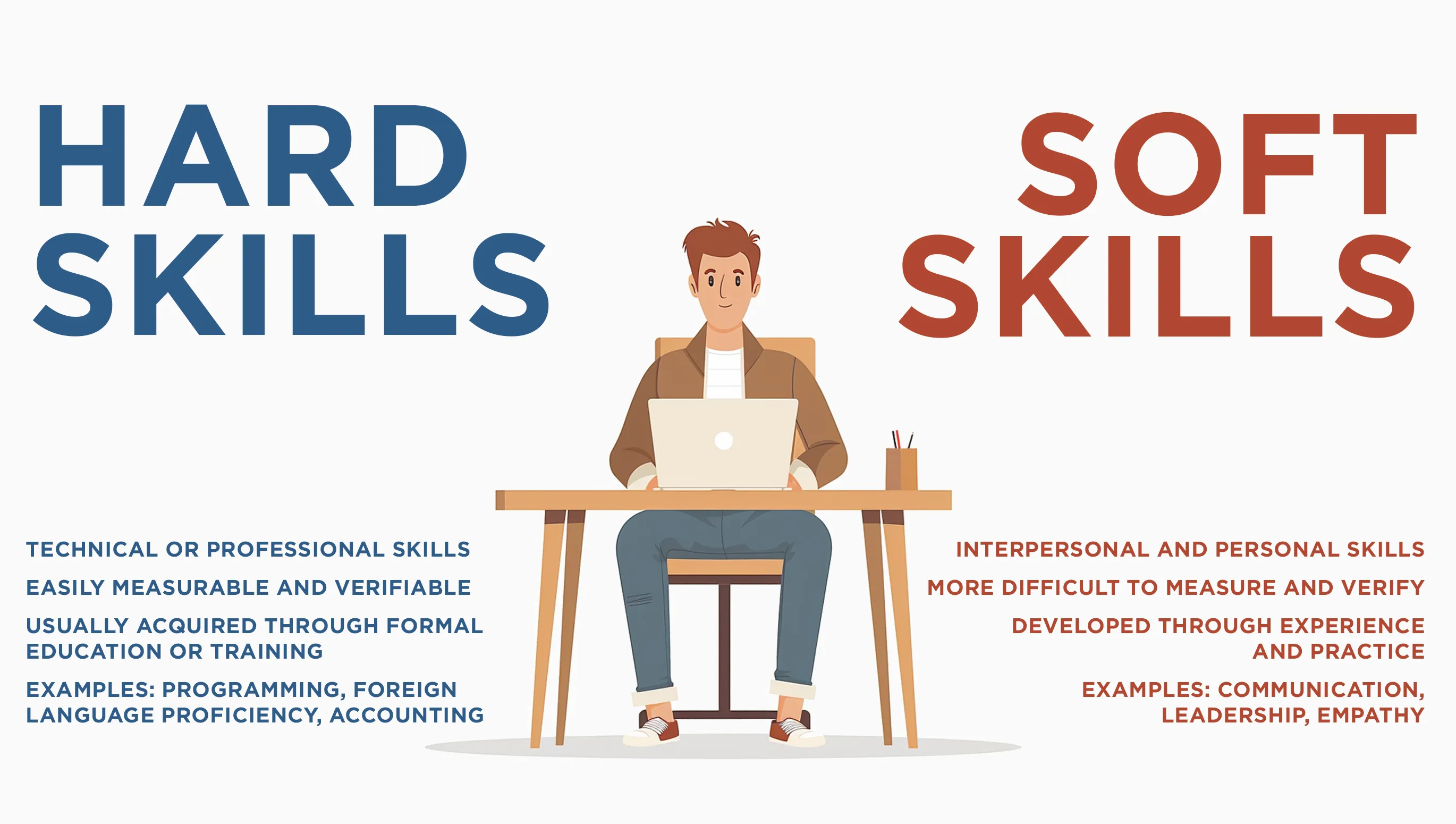Soft Skills: What is that, examples, and how to develop them
In the professional environment, the term "Soft Skills" is becoming increasingly common. These skills are becoming a key factor for career success, regardless of the field of activity. Find out what Soft Skills are, which ones are most in demand, how they differ from Hard Skills, and how you can improve them.

Soft Skills: What are they?
Soft Skills, or "soft skills", consist of a set of non-specialized, cross-professional skills that are responsible for successful participation in the work process and high productivity. In contrast to Hard Skills (technical skills), which represent professional knowledge and skills, Soft Skills refer to personal qualities and social skills.
These skills enable effective and harmonious interaction with other people and successful handling of professional and personal challenges. Soft Skills include emotional intelligence, communication skills, teamwork, leadership qualities, adaptability, and much more.
Soft Skills: Examples
Let's consider the most in-demand Soft Skills and their significance:

- Communication Skills: Expressing oneself clearly and effectively both orally and in writing. This includes listening, understanding, and conveying information.
- Emotional Intelligence: Recognizing, understanding, and managing one's own emotions and those of others.
- Critical Thinking: Analyzing information, evaluating different perspectives, and making informed decisions.
- Adaptability: Quickly adapting to new situations, technologies, and work methods.
- Teamwork: Collaborating effectively with others, contributing to the overall result, and resolving conflicts.
- Leadership: Inspiring and guiding others, taking responsibility, and making strategic decisions.
- Time Management: Planning and organizing time effectively and setting priorities.
- Creativity: Generating new ideas and finding unconventional solutions to problems.
Soft Skills vs. Hard Skills
Comparing Soft Skills and Hard Skills helps to understand their differences and significance in professional development:

Hard Skills:
- Technical or professional skills
- Easily measurable and verifiable
- Usually acquired through formal education or training
- Examples: Programming, foreign language proficiency, accounting
Soft Skills:
- Interpersonal and personal skills
- More difficult to measure and verify
- Developed through experience and practice
- Examples: Communication, leadership, empathy
Soft Skills are becoming increasingly important for several reasons:
- Automation: Many technical tasks are automated while Soft Skills remain uniquely human.
- Globalization: Communication and adaptability skills are important in a multicultural environment.
- Dynamics of the job market: Soft Skills enable easier adaptation to professional changes.
- Teamwork: Most projects require effective collaboration within a team.
- Innovations: Creativity and critical thinking are necessary for creating innovations.
Soft Skills: How to develop them
Developing Soft Skills requires time and practice. Here are some effective methods:
Self-analysis and Feedback:
- Evaluate your Soft Skills regularly.
- Ask colleagues and superiors for feedback.
Practice and Experience:
- Actively seek opportunities to apply Soft Skills in work and life.
- Participate in projects that require teamwork and leadership.
Training and Workshops:
- Attend courses and seminars on Soft Skills development.
- Study books and online resources on this topic.
Mentoring and Coaching:
- Find a mentor to help you develop Soft Skills.
- Consider collaborating with a professional coach.
Expanding the comfort zone:
- Take on new tasks and roles.
- Put yourself in situations that require different soft skills.
Reflection and continuous improvement:
- Regularly analyze your experiences and learn from them.
- Set specific goals for developing certain soft skills.
Practicing empathy and active listening:
- Try to understand others' perspectives.
- Develop active listening skills in daily communication.
Conclusion
Soft skills play a key role in the professional field. They complement technical skills and are often the decisive factor in hiring, career advancement, and success in various areas of life. Developing soft skills is a continuous process that requires a conscious approach and practice. By investing time and effort in developing these skills, you significantly increase your value as a professional and expand your opportunities for personal growth.
Remember, the balance between hard skills and soft skills is the key to building a successful and fulfilling career in a constantly changing work environment.
From Vitalii Shynakov
